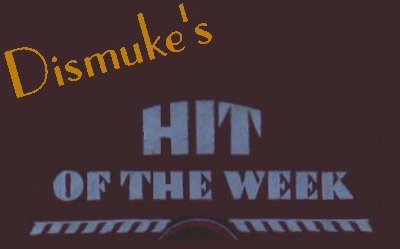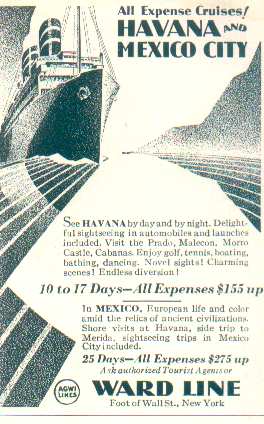

June 2002
June 27, 2002
This week's Hit of the Week is brought
to you by

Click on image or here
to see full size
(From 1938 ad)
I'se
A Muggin'
Joe Haymes and His Orchestra
Cliff Weston and the Headliners,
vocal 1936
(Perfect 6-05-09 mx 18806)
I have a tendency to neglect recordings
from the swing era in favor of those from the period immediately
preceding it. To help make up for it, here's a real swinging selection
replete with scat singing and jive talk lyrics.
According to Cab
Calloway's Hepster Dictionary, the term "muggin'" means "making 'em
laugh, putting on the jive."
"I'se A Muggin'" was composed by
violinist Stuff Smith who also headed a jazz sextet called Stuff Smith
and His Onyx Club Boys. Along with "If You'se A Viper," it one of the group's
most famous numbers.
Joe Haymes (1908 -1964) fronted
several bands during his career and was among the first white bandleaders
to switch to a swing format. While his bands were well received by
music critics, they only achieved modest commercial success. His
roster of musicians impressed Tommy Dorsey enough that, after he had his
famous fight with brother Jimmy and walked out of the Dorsey Brothers'
Dance Orchestra in 1935, he worked out a deal to take over the Haymes band
more or less intact. Under Dorsey, it became on of the most successful
bands of the swing and big band eras.
After Dorsey took over around September
1935, Haymes formed another band - the one heard on this week's selection.
Vocalist Cliff Weston had been with Haymes at least as early as 1934.
He stayed on as a vocalist with the Dorsey band for a brief while before
being replaced with Jack Leonard. Weston then went to work for Haymes'
new band.
It was Joe Haymes who, in 1927,
hired a vocal trio from Minnesota called "The McMichaels" which later became
one of the most famous vocal groups of the early 1940s, The Merry Macs.
June 20, 2002
This week's Hit of the Week is brought
to you by

(From 1929 ad)
Dime
Carlos Molina and His Orchestra
1934
(Brunswick 4058)
From the 1930s through the 1950s
Latin American dance music had a large following in the United States.
Perhaps the best remembered bandleader of this genre was Desi Arnez who,
along with his actress wife Lucille Ball, became a highly successful television
star and studio owner. At the time, however, the most famous U.S.
based Latin band was Xavier Cugat's which was, for many years, a fixture
at New York's posh Waldorf-Astoria Hotel. Other successful bandleaders
included Enric Madriguera, Henry King and this week's featured artist,
Carlos Molina.
I have not been able to locate a
whole lot of biographical information about Carlos Molina - but judging
by the number of records he made, he was apparently quite popular during
the 1930s and was active into at least the 1950s. In 1930, he served
as music director for the US produced Spanish language film Así
es la vida. In 1949, Molina and his band starred in the musical
short film Rhythm of the Mambo. He also had bit roles as a
bandleader in several films during the 1940s and 1950s. Carlos Molina
died in 1982.
I am quite fond of this genre -
especially 1930s recordings of upbeat rhumbas. While this selection
is a bit on the slow side, observe that it is, nevertheless, very rhythmic.
I also think it has a rather pretty tune.
According to one
online translation site, the Spanish word "dime" translates to "say me."
For those who are interested in
exploring Latin American dance music of the era further, I highly recommend
an excellent CD called "Cuban Big Bands 1940-1942" which can be found (along
with sample sound clips) by doing a title search at either cdnow.com or
at Amazon.com.
June 13, 2002
This week's Hit of the Week is brought
to you by

New De Luxe models...favorites
of fashion...easily the finest of their kind. Gleaming white porcelain,
offset in harmonizing colors of your own selection. Masterpieces
of efficiency, abounding in features such as cathedral-top doors, satin-finish
hardware, electric illumination, double-depth desert drawers, absence of
drain pipe, cold-tray for crisping salads, 3 and 4 inches of cork insulation.
From 5 to 20 cubic feet of food storage space...108-378
ice cubes at one freezing. These and other Copelands, some as low
as $195 at factory, are described in a beautifully illustrated booklet
which will gladly be sent upon request.
COPELAND
630 Lycaste Ave.
Detroit, Michigan
|
(From 1928 ad)
Where
The Shy Little Violets Grow
Colonial Club Orchestra
Jack Parker, vocal
1928
(Brunswick 4058)
Here's a nice and snappy number
that I picked up recently in a 78 rpm record auction. Too bad the
song has such a hokey title.
The Colonial Club Orchestra was
a Brunswick Records recording pseudonym used by the Bob Haring Orchestra.
I have previously featured another version of this song by the Campus Boys
(a Harry Reser pseudonym) in this site's 1920s & 1930s section.
June 6, 2002
This week's Hit of the Week is brought
to you by

| YOU, too, will find a joyous
thrill in casting off the shackles of everyday life for awhile...to visit
a land of colorful beauty and mingle with the congenial and hospitable
people of Ontario, where all is different but the language. Where
there is food for tired body and soul.
Here are modern cities and quaint, fascinating
villages where customs, sights, and sounds are new...refreshing.
...Or if you prefer the fragrance of forests and
the thrill of a taut line and a singing reel; up-to-date tent and cottage
camps along the shores of lakes and streams are plentiful...reached by
splendid, uncrowded highways.
ONTARIO PUBLICITY BUREAU
Dept. H, Parliament Buildings
Queen's Park, Toronto, Canada
FREE
Write for interesting booklet
|
(From 1929 ad)
I want to take this opportunity to
thank Dan Taylor for the interesting and entertaining aviation themed Hit
of the Week Updates that he furnished for the month of May. I hope
everyone enjoyed them as much as I did.

I'm
Gonna Count My Sheep
Missouri Jazz Band
Jerry White, vocal
1929
(Romeo 1136-B mx 19098)
This week's selection was recorded
exactly one week before the October 29 "Black Tuesday" crash of the stock
market. The record, however, was not released until early 1930.
The Missouri Jazz Band was a recording
pseudonym used by a number of groups during the 1920s and early 1930s including
the Joseph Samuels, Adrian Schubert, Ben Selvin and Noble Sissle bands.
This week's selection is performed by the Adrian Schubert band. The pseudonym
seems to have most frequently appeared on the Banner label. My copy
presented here comes from an old Romeo disc - but it was also issued on
Banner and perhaps some other labels as well. By late 1929, the parent
companies of both the Banner and Romeo labels had merged to form the American
Record Corporation which would become a major player in what was left of
the record industry during the Great Depression. Through the mid-1930s,
it was a fairly common practice for a recording to be issued, sometimes
under different pseudonyms, on several affiliated labels. Banner
records were primarily sold through the
S.S. Kresge dime store chain while Romeos were primarily sold at rival
S.H.
Kress & Co.
I think this is a rather catchy
tune and am especially fond of the xylophone solos heard throughout. The
first 15 seconds or so of this recording have some defects that my audio
restoration software was unable to remove. Nevertheless, thanks to
the software, the rest of it sounds great.

|





